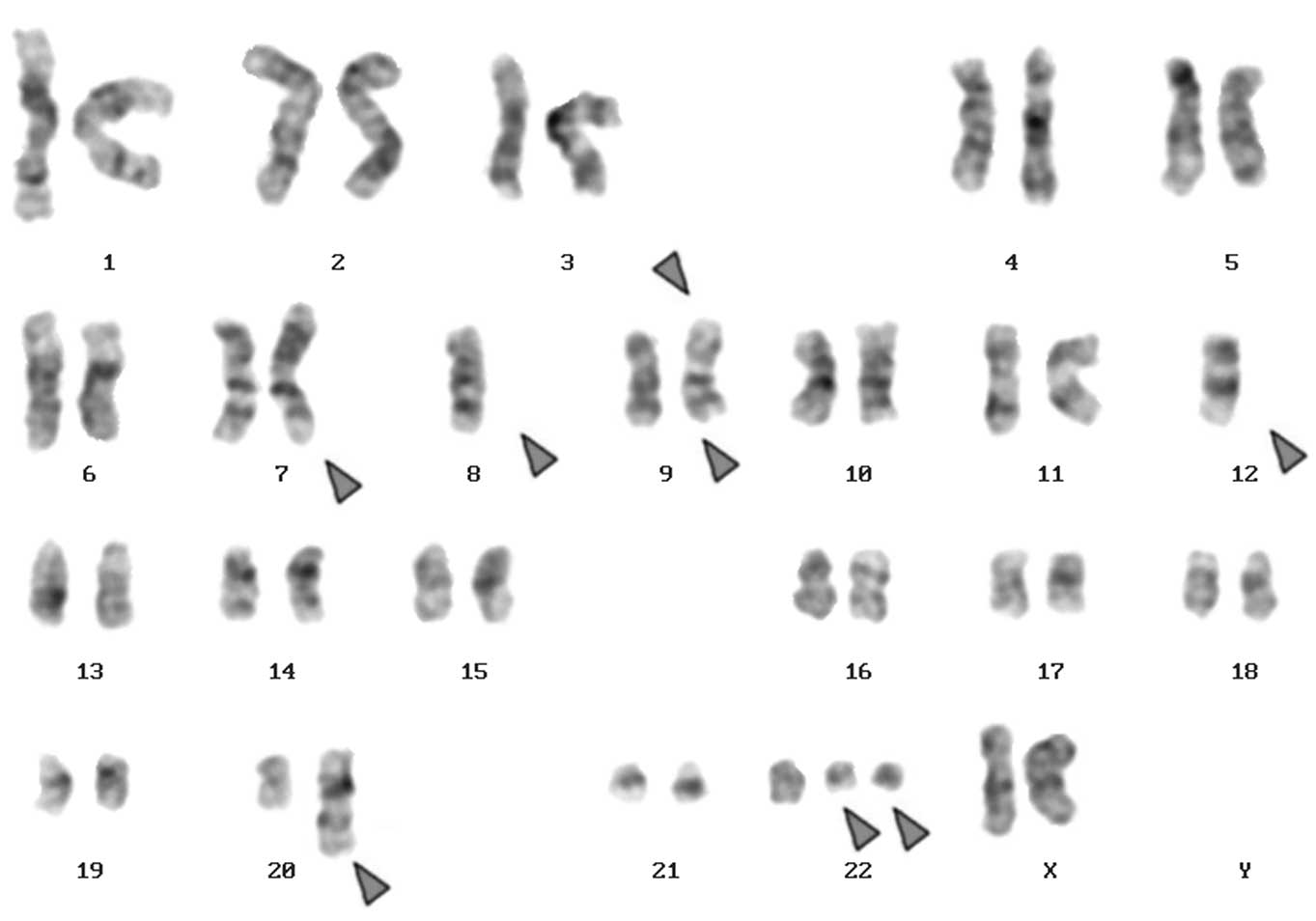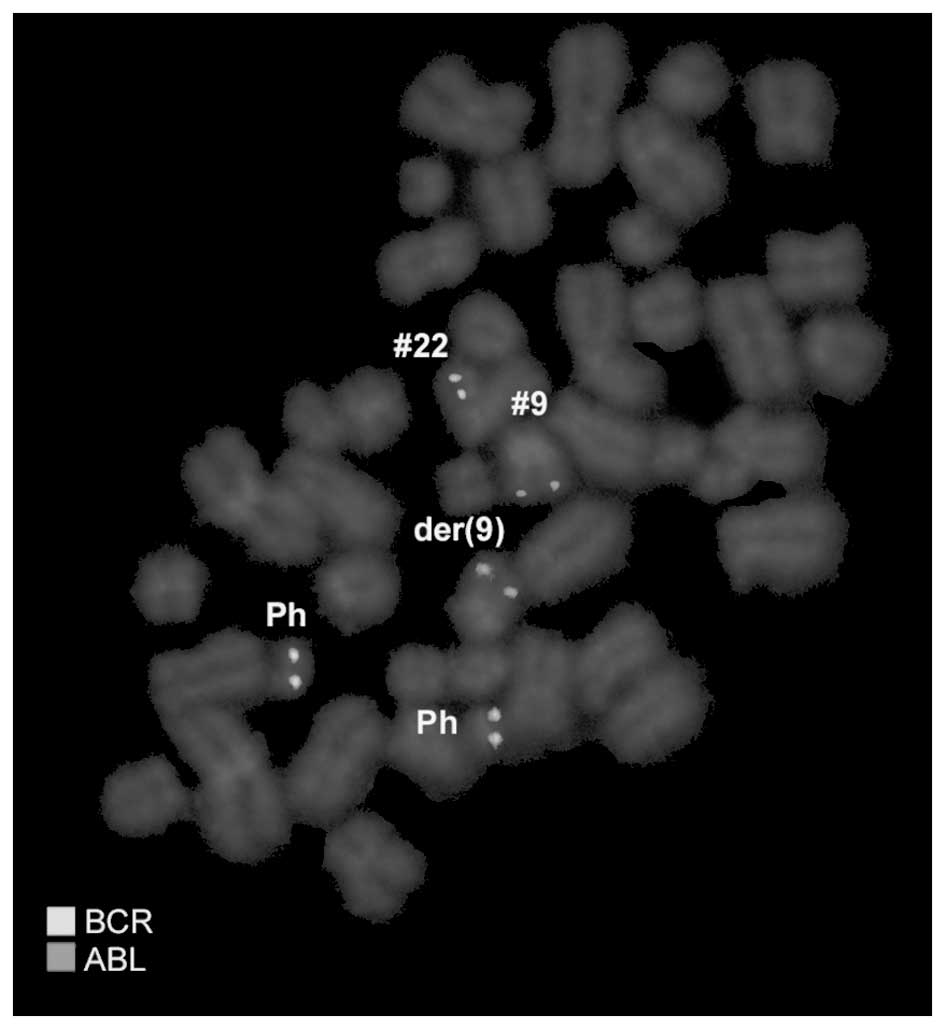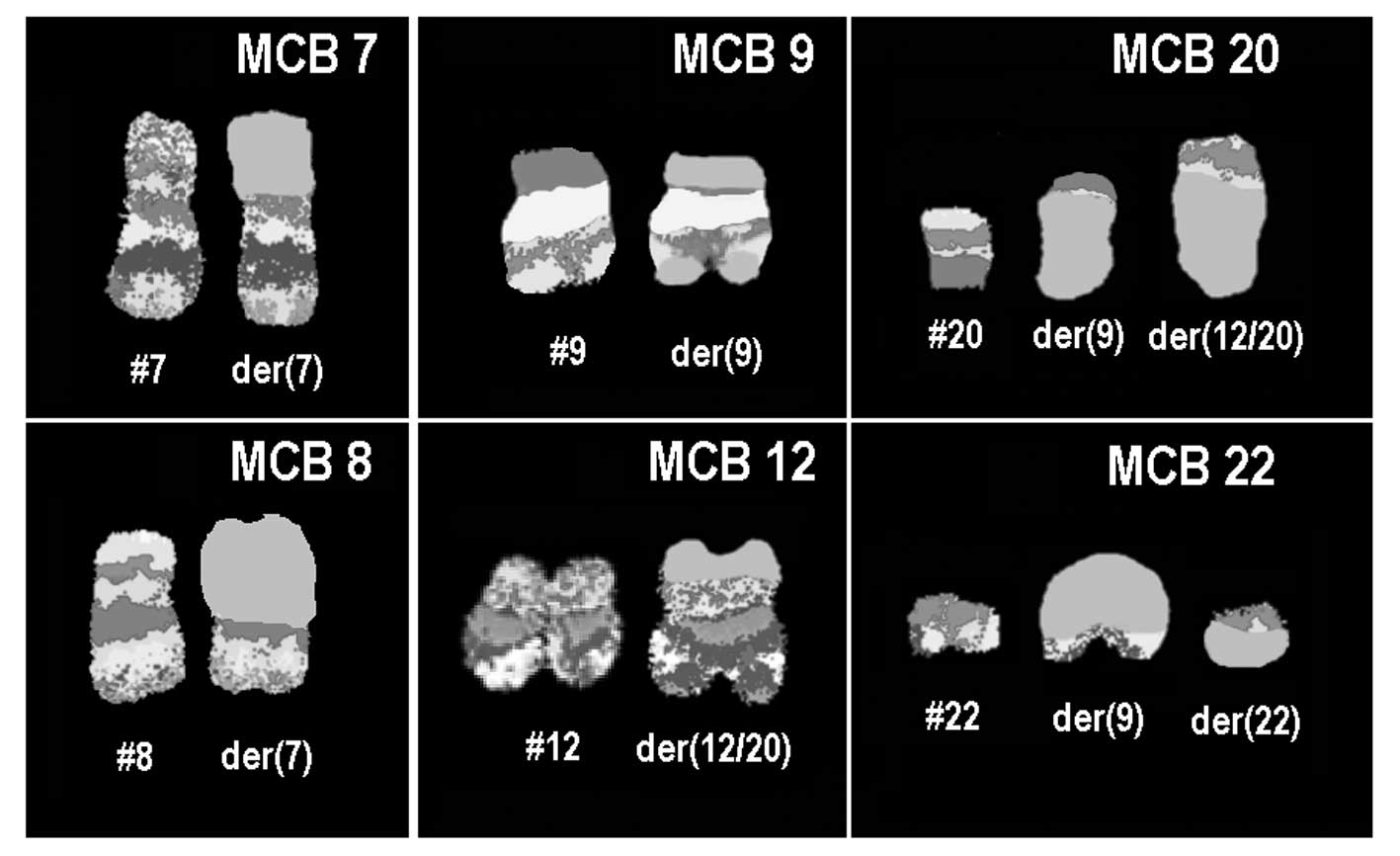|
1.
|
Sawyers CL: Chronic myeloid leukemia. N
Engl J Med. 340:1330–1340. 1999. View Article : Google Scholar : PubMed/NCBI
|
|
2.
|
Johansson B, Fioretos T and Mitelman F:
Cytogenetic and molecular genetic evolution of chronic myeloid
leukemia. Acta Haematol. 107:76–94. 2002. View Article : Google Scholar : PubMed/NCBI
|
|
3.
|
Adriana Z and Al Bahar S: Novel four-way
Ph translocation t(9;22;7;1)(q34;q11;q22;p13) in a chronic myeloid
leukemia patient receiving tyrosine kinase inhibitor therapy. Int J
Hematol. 95:315–319. 2012. View Article : Google Scholar : PubMed/NCBI
|
|
4.
|
Sandberg AA: The Chromosomes in Human
Cancer and Leukemia. 2nd edition. Elsevier Science; New York, NY:
pp. 151–172. 1990
|
|
5.
|
Druker BJ, Guilhot F, O’Brien SG, Gathmann
I, Kantarjian H, Gattermann N, et al: Five-year follow-up of
patients receiving imatinib for chronic myeloid leukemia. N Engl J
Med. 355:2408–2417. 2006.PubMed/NCBI
|
|
6.
|
Reid A, Gribble SM, Huntly BJ, Andrews KM,
Campbell L, Grace CD, Wood ME, Green AR and Nacheva EP: Variant
Philadelphia translocations in chronic myeloid leukaemia can mimic
typical blast crisis chromosome abnormalities or classic t(9;22): a
report of two cases. Br J Haematol. 113:439–442. 2001. View Article : Google Scholar
|
|
7.
|
Al-Achkar W, Wafa A, Klein E and Aljapawe
A: Biclonal myelodysplastic syndrome involving six chromosomes and
monoallelic loss of RB1 - A rare case. Mol Cytogenet. 4:162011.
View Article : Google Scholar : PubMed/NCBI
|
|
8.
|
Shaffer L, Slovak M and Cambell L: ISCN
(2009): An International System for Human Cytogenetic Nomenclature.
1st edition. S. Karger AG; Basel: 2009
|
|
9.
|
Chien JH, Tang JL, Chen RL, Li CC and Lee
CP: Detection of BCR-ABL gene mutations in Philadelphia chromosome
positive leukemia patients resistant to STI-571 cancer therapy.
Leuk Res. 32:1724–1734. 2008. View Article : Google Scholar : PubMed/NCBI
|
|
10.
|
Rothe G and Schmitz G: Consensus protocol
for the flow cyto-metric immunophenotyping of hematopoietic
malignancies. Working Group on Flow Cytometry and Image Analysis.
Leukemia. 10:877–895. 1996.PubMed/NCBI
|
|
11.
|
Mitelman F, Johansson B and Mertens F:
Mitelman Database of Chromosome Aberrations in Cancer. http://cgap.nci.nih.gov/Chromosomes/Mitelman.
Accessed October 3, 2012.
|
|
12.
|
Reid AG, Huntly BJP, Grace C, Green AR and
Nacheva EP: Survival implications of molecular heterogeneity in
variant Philadelphia-positive chronic myeloid leukaemia. Br J
Haematol. 121:419–427. 2003. View Article : Google Scholar : PubMed/NCBI
|
|
13.
|
Bennour A, Sennana H, Laatiri MA, Khelif A
and Saad A: A masked BCR/ABL rearrangement in a case of chronic
myeloid leukemia with translocation t(3;9)(p14;q34). Cancer Genet
Cytogenet. 181:72–74. 2008. View Article : Google Scholar : PubMed/NCBI
|
|
14.
|
Hochhaus A, Kreil S, Corbin AS, La Rosée
P, Müller MC, Lahaye T, Hanfstein B, Schoch C, Cross NCP, Berger U,
Gschaidmeier H, Druker BJ and Hehlmann R: Molecular and chromosomal
mechanisms of resistance to imatinib (STI571) therapy. Leukemia.
16:2190–2196. 2002. View Article : Google Scholar : PubMed/NCBI
|
|
15.
|
Bacher U, Schnitter S, Kern W, Hiddemann
W, Haferlach T and Schoch C: The incidence of submicroscopic
deletions in reciprocal translocations is similar in acute myeloid
leukemia, BCR-ABL positive acute lymphoblastic leukemia and chronic
myeloid leukemia. Haematologica. 90:558–559. 2005.
|
|
16.
|
Bennour A, Sennana H, Laatiri MA, Elloumi
M, Khelif A and Saad A: Molecular cytogenetic characterization of
variant Philadelphia translocations in chronic myeloid leukemia:
genesis and deletion of derivative chromosome 9. Cancer Genet
Cytogenet. 194:30–37. 2009. View Article : Google Scholar
|
|
17.
|
Brunning RD, Matutes E, Borowitz M, et al:
Acute leukaemias of ambiguous lineage. World Health Organization
Classification of Tumours: Pathology and Genetics of Tumours of
Haemopoietic and Lymphoid Tissues. Jaffe ES, Harris NL, Stein H and
Vardiman JW: IARC Press; Lyon, France: pp. 106–107. 2001
|
|
18.
|
Carbonell F, Swansbury J, Min T, Matutes
E, Farahat N, Buccheri V, Morilla R, Secker-Walker L and Catovsky
D: Cytogenetic findings in acute biphenotypic leukaemia. Leukemia.
10:1283–1287. 1996.PubMed/NCBI
|
|
19.
|
Downward J: Targeting RAS signalling
pathways in cancer therapy. Nat Rev Cancer. 3:11–22. 2003.
View Article : Google Scholar : PubMed/NCBI
|
|
20.
|
Wlodarska I, Martin-Garcia N, Achten R, De
Wolf-Peeters C, Pauwels P, Tulliez M, de Mascarel A, Briere J,
Patey M, Hagelmeijer A and Gaulard P: Fluorescence in situ
hybridization study of chromosome 7 aberrations in hepatosplenic
T-cell lymphoma: isochromosome 7q as a common abnormality
accumulating in forms with features of cytologic progression. Genes
Chromosomes Cancer. 33:243–251. 2002. View Article : Google Scholar
|
|
21.
|
Qin LX: Chromosomal aberrations related to
metastasis of human solid tumors. World J Gastroenterol. 8:769–776.
2002.PubMed/NCBI
|
|
22.
|
Mancini M, Scappaticci D, Cimino G, Nanni
M, Derme V, Elia L, Tafuri A, Vignetti M, Vitale A, Cuneo A,
Castoldi G, Saglio G, Pane F, Mecucci C, Camera A, Specchia G,
Tedeschi A, Di Raimondo F, Fioritoni G, Fabbiano F, Marmont F,
Ferrara F, Cascavilla N, Todeschini G, Nobile F, Kropp MG, Leoni P,
Tabilio A, Luppi M, Annino L, Mandelli F and Foà R: A comprehensive
genetic classification of adult acute lymphoblastic leukemia (ALL):
analysis of the GIMEMA 0496 protocol. Blood. 105:3434–3441. 2005.
View Article : Google Scholar : PubMed/NCBI
|
|
23.
|
Andreasson P, Johansson B, Arheden K,
Billstrom R, Mitelman F and Hoglund M: Deletions of CDKN1B and ETV6
in acute myeloid leukemia and myelodysplastic syndromes without
cytogenetic evidence of 12p abnormalities. Genes Chromosomes
Cancer. 19:77–83. 1997. View Article : Google Scholar : PubMed/NCBI
|

















